Citizen Kane (1 May 1941)
Writ. Herman J. Mankiewicz
Dir. Orson Welles
w/ Orson Welles, Joseph Cotten, Dorothy Comingore, Everett Sloane
It's hard to write a review of a movie of such legendary proportions as this without either in some way talking down to a given audience or perhaps omitting certain vital information that could potentially help bring into focus one of the greatest influences of twentieth century. One of the first things that should be understood is that at the still tender age of twenty-four Welles was hailed by many to be a genius and ahead of his time even in the era in which Kane first appeared. In a Brussels poll of international critics in '58, just seventeen years after the film's meager initial profits led RKO to strip him of his only claim to auteurship, this was voted one of the 12 best films of all time. [1] Despite the critical acclaim, and the pronouncement of Kane as an unparalleled masterpiece, the young filmmaker would never again have total creative control of any of his projects. [2]
Greg Toland's photography, which virtually refuses to have anything less than two or more layers, stands alone as evidence to what makes film the unique, nearly boundless medium that it is. It's understood that a filmmaker really can't fill a screen enough, that the amount of visual "busy-ness" is sort of limitless. The audience understands that it's viewing a compression of images and thoughts, deeds and concepts that have been translated to the two-dimensional realms of "dialogue" and "action" and that, within the framework of the aspect ratio, the actual amount of information doesn't have a cap any higher than the writer's ability to convey the story. [3] But it also helps if you happen to have a really talented director by your side.
In any of the interviews the older, wiser Welles can be found, it isn't likely that you'll see much in the way of humility. The man is, like the enigmatic hero he embodies, a testament to his own inexplicable genius, as though he had pulled his brain out of a Cracker Jack box one day and just hadn't gotten over such good fortune since then. What's amazing is that despite being completely full of himself, he is not in any way a turn-off. Partly, this is because this film is not, oh, say, Crossroads, [4] but also because of his own sort of jovial glee with the world. He would have made a good elf in any case. Unhampered by the all-too-powerful studio, he would have made a spectacular icon; as things are, though, we have to settle for the film itself to be the icon and allow Welles's memory to fade into speculative ignominy. What his body of work could have been without this crippling blow the world will never know, which only adds to the joy of the feat itself. After all, what we have here is a director who made one film, just one film, that changed the way people see movies, the way people think about movies, and that people haven't shut up about ever since.
Why not? Well, the use of the narrative voice-over/"paper-over" to depict in a rather short time a great deal about an intricate life, for one. The layers used by the d.p. and the sound editor to keep the depth of the film at a near-constant, however, are the real pith that earns Kane its marks again and again. Take, for example, the scene in which the reporter wants to talk to the second Mrs. Kane in the hopes of learning about the elusive Rosebud. The scene itself lasts maybe a minute, but several things are made clear without any hustling of the actors. Susan is drunk, but not drunk enough to talk; the reporter needs to get in touch with his editor; the waiter, in the hopes of making a quick buck, wants to get Susan drunker; there's a lead story that's circulating somewhere, but where? The use of sound alone in that scene marked a milestone in filmmaking history. That the images are clear and crisp and the story itself is interesting is just...nice. [5]
You may also want to check out Lucas's Article or Matt's.
[1] Kinda makes ya wonder what the other ones were, doesn't it.
[2] Which, without thumbing my nose at all those who would say that Ambersons is his best work, because I believe in individuality, is something to consider.
[3] There are also examples of movies in which a lot of information is happening, but the story is really very simple. Minority Report is one of them, and a good comparison. Also, from a writer's perspective, this is a very cool thing where the rewards are always worth the creative challenges.
[4] I'm sort of expecting the thought police to break into my terminal for having the audacity to flippantly compare Crossroads and Citizen Kane; but alas, they are both the same medium.
[5] I think I managed not to mention much of the obvious here except the narrative. Good. What do you think?
Dir. Orson Welles
w/ Orson Welles, Joseph Cotten, Dorothy Comingore, Everett Sloane
It's hard to write a review of a movie of such legendary proportions as this without either in some way talking down to a given audience or perhaps omitting certain vital information that could potentially help bring into focus one of the greatest influences of twentieth century. One of the first things that should be understood is that at the still tender age of twenty-four Welles was hailed by many to be a genius and ahead of his time even in the era in which Kane first appeared. In a Brussels poll of international critics in '58, just seventeen years after the film's meager initial profits led RKO to strip him of his only claim to auteurship, this was voted one of the 12 best films of all time. [1] Despite the critical acclaim, and the pronouncement of Kane as an unparalleled masterpiece, the young filmmaker would never again have total creative control of any of his projects. [2]
Greg Toland's photography, which virtually refuses to have anything less than two or more layers, stands alone as evidence to what makes film the unique, nearly boundless medium that it is. It's understood that a filmmaker really can't fill a screen enough, that the amount of visual "busy-ness" is sort of limitless. The audience understands that it's viewing a compression of images and thoughts, deeds and concepts that have been translated to the two-dimensional realms of "dialogue" and "action" and that, within the framework of the aspect ratio, the actual amount of information doesn't have a cap any higher than the writer's ability to convey the story. [3] But it also helps if you happen to have a really talented director by your side.
In any of the interviews the older, wiser Welles can be found, it isn't likely that you'll see much in the way of humility. The man is, like the enigmatic hero he embodies, a testament to his own inexplicable genius, as though he had pulled his brain out of a Cracker Jack box one day and just hadn't gotten over such good fortune since then. What's amazing is that despite being completely full of himself, he is not in any way a turn-off. Partly, this is because this film is not, oh, say, Crossroads, [4] but also because of his own sort of jovial glee with the world. He would have made a good elf in any case. Unhampered by the all-too-powerful studio, he would have made a spectacular icon; as things are, though, we have to settle for the film itself to be the icon and allow Welles's memory to fade into speculative ignominy. What his body of work could have been without this crippling blow the world will never know, which only adds to the joy of the feat itself. After all, what we have here is a director who made one film, just one film, that changed the way people see movies, the way people think about movies, and that people haven't shut up about ever since.
Why not? Well, the use of the narrative voice-over/"paper-over" to depict in a rather short time a great deal about an intricate life, for one. The layers used by the d.p. and the sound editor to keep the depth of the film at a near-constant, however, are the real pith that earns Kane its marks again and again. Take, for example, the scene in which the reporter wants to talk to the second Mrs. Kane in the hopes of learning about the elusive Rosebud. The scene itself lasts maybe a minute, but several things are made clear without any hustling of the actors. Susan is drunk, but not drunk enough to talk; the reporter needs to get in touch with his editor; the waiter, in the hopes of making a quick buck, wants to get Susan drunker; there's a lead story that's circulating somewhere, but where? The use of sound alone in that scene marked a milestone in filmmaking history. That the images are clear and crisp and the story itself is interesting is just...nice. [5]
You may also want to check out Lucas's Article or Matt's.
[1] Kinda makes ya wonder what the other ones were, doesn't it.
[2] Which, without thumbing my nose at all those who would say that Ambersons is his best work, because I believe in individuality, is something to consider.
[3] There are also examples of movies in which a lot of information is happening, but the story is really very simple. Minority Report is one of them, and a good comparison. Also, from a writer's perspective, this is a very cool thing where the rewards are always worth the creative challenges.
[4] I'm sort of expecting the thought police to break into my terminal for having the audacity to flippantly compare Crossroads and Citizen Kane; but alas, they are both the same medium.
[5] I think I managed not to mention much of the obvious here except the narrative. Good. What do you think?
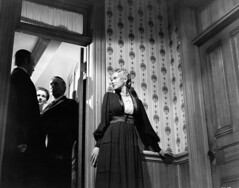



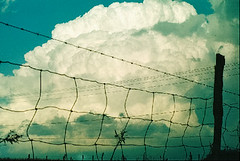
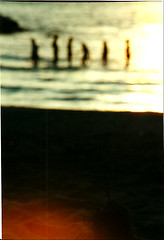

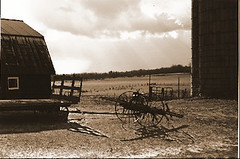
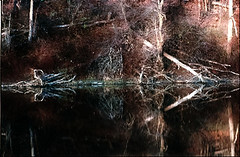






0 Comments:
Post a Comment
<< Home